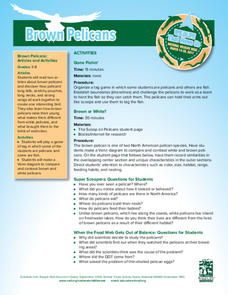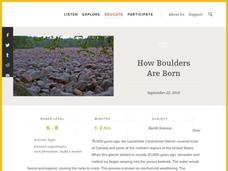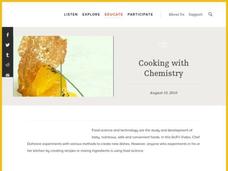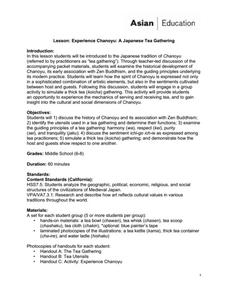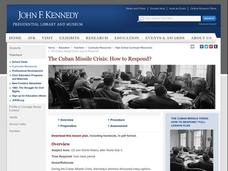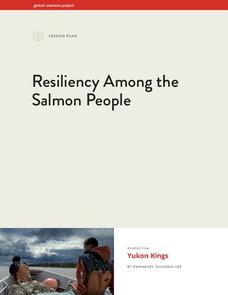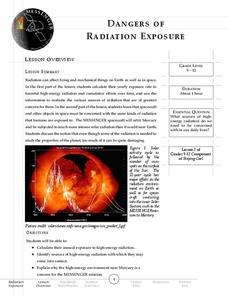Curated OER
Transparent Shoebox Dig
Take this simulated archaeological dig one layer at a time with your young pupils to encourage observation, critical thinking, and careful attention. Using a transparent box full of layers of sand and artifacts, pupils examine the...
Texas Instruments
Sands of Time
Twelfth graders explore an application of integration. A calculus lesson prompts class members to find the length of the day where they live during the winter and summer solstice. Using data relating to the solstices at...
National Wildlife Federation
Brown Pelicans
Even animals that are part of the same species have differences. Learners read a passage about white and brown pelicans and compare their features. They recognize that although the birds look very similar, they also have their own unique...
Science Friday
How Boulders Are Born
Want your class to rock? Then try this boulder activity. Pupils learn about a specific boulder field and use edible materials to demonstrate the geological processes that formed this unique feature. Weathering, erosion, and mass...
Science Friday
Cooking with Chemistry
Use class time to perfect your hollandaise sauce with a chemistry lesson. It includes two activities to teach about immiscible liquids, emulsifiers, and creating a stable homogenous mixture. Young scientists first mix...
Curated OER
Grade A: The Market for a Yale Woman's Eggs by Jessica Cohen
What would it be like to sell your eggs to a couple who can't have children on their own? Could you even imagine it? As most of us have never been in this position, this descriptive essay is really quite interesting. The reading itself...
Penn Museum
Penn Museum: China Gallery
Invite your learners to take a closer look at the art and mathematical function of dome buildings as designed by the ancient Romans. In the next segment of this attractive worksheet set, your young historians will then learn about...
Asian Art Museum
Experience Chanoyu: A Japanese Tea Gathering
As part of the study of Japanese cultural history, introduce your class members to Chanoyu, the Way of Tea. After a discussion of the history and key elements of Chanoyu, class groups perform the ceremony.
Discover Earth
Weather Stations
Transform your classroom into a fully functioning weather station with this series of hands-on investigations. Covering the topics of temperature, precipitation, wind patterns, and cloud formation, these activities engage young...
Civil War Trust
Gettysburg Address
The Gettysburg Address may have been four score and seven years ago, but its message is still as relevant today. Young historians explore the context of the famous speech, as well as its central theme and argument, before discussing the...
Civil War Trust
The Common Civil War Soldier
Imagine you are a soldier in the Civil War. What are you wearing? What do you need to carry with you? Examine the life of a person during the Civil War, from drummer boys to powder monkeys to musket-toting soldiers. Elementary...
Civil War Trust
The Gathering Storm: The Coming of the Civil War
Take a longer look at a formative time in history with a lesson that explores the causes of the American Civil War. After viewing a series of images and explanations for various forces at play, middle schoolers choose the images that...
American Chemical Society
Isolation of Phytochrome
Why do soybean plants that are planted weeks apart in the spring mature simultaneously in the fall? Four independent activities cover the history of phytochrome research, scientist collaboration, the electromagnetic spectrum, and...
American Chemical Society
Development of Baking Powder
Did you know baking powder can be used to treat acne, whiten teeth, and make sugar cookies? The lesson on the development of baking powder is ready-to-go with no preparation required. Through readings, pupils answer questions, complete...
American Chemical Society
Joseph Priestley, Discoverer of Oxygen
Do you want to hear a joke about nitrogen and oxygen? NO. We all know there is oxygen in the air and that plants produce oxygen, but how was it discovered? Scholars read a handout, answer questions, and analyze material in the...
John F. Kennedy Presidential Library & Museum
The Cuban Missile Crisis: How to Respond?
For 13 days, the United States stood on the edge of nuclear War. The Soviet Arms buildup in Cuba is the focus of an activity that asks groups to analyze how the governmental role each of John F. Kennedy's advisors played went on to...
Peace Corps
Brief Encounters
How are Pandyas different than Chispas? Explore cultural norms and societal behaviors with an engaging role-play activity. Split into groups of two hypothetical cultural groups, the formal Pandyas and the sociable Chispas, and another...
National Park Service
Hibernation-Migration-Fascination
What's the difference between hibernation and a good nap? Find out with an engaging life science activity that compares the hibernation habits of grizzly bears and marmots. After learners read an informational passage about each mammal,...
Civil War Trust
Civil War Newspaper
One photograph can represent so much more than the images on the film. Eighth graders select a photograph from the Civil War era and conduct additional research based on the subject matter from the picture. Once they complete the...
Global Oneness Project
Resiliency Among the Salmon People
Is losing cultural traditions the cost of social progress, or should people make stronger efforts to preserve these traditions? High schoolers watch a short film about the native Yup'ik people in Alaska and how they handle the shifts in...
Messenger Education
Dangers of Radiation Exposure
Gamma radiation, which is harmful, is useful in treating cancers. In the second lesson in a series of four, young scientists take surveys and calculate their yearly exposure to ionizing radiation. Then they read about how harmful their...
University of Colorado
The Moons of Jupiter
Can you name the three planets with rings in our solar system? Everyone knows Saturn, many know Uranus, but most people are surprised to learn that Jupiter also has a ring. The third in a series of six teaches pupils what is around...
National Park Service
Subalpine Web
The theory of keystone species in an ecosystem was first established in 1969 by Robert T. Paine. Pupils open the final lesson in a five-part series with a game guessing which member of the alpine ecosystem they are based on clues. After...
Federal Reserve Bank
Lesson 1: Katrina Strikes
Most families have an emergency kit in their home with flashlights, water, and extra food. But what happens to your money when disaster strikes? An economics lesson plan focused on the aftermath of Hurricane Katrina in 2005 demonstrates...




